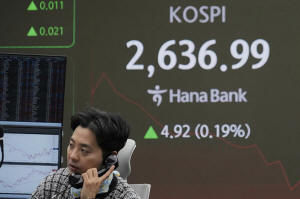Stock market today: World shares are mixed, Chinese markets decline,
after rally on Wall St
[March 25, 2025] ELAINE
KURTENBACH
BANGKOK (AP) — World shares were mixed on Tuesday, with Chinese markets
retreating, following a broad rally on Wall Street fueled by hopes the
Trump administration may take a more targeted approach as it tees up a
new round of tariffs on imported goods next week.
Germany's DAX added 0.5% to 22,964.34, while the CAC 40 in Paris was up
0.7% at 8,078.73. Britain's FTSE 100 advanced 0.4% to 8,673.19.
The futures for the S&P 500 and the Dow Jones Industrial Average were
0.2% lower.
In Asian trading, Tokyo's Nikkei 225 gained 0.5% to 37,780.54, while the
Kospi in South Korea lost 0.6% to 2,615.81.
Hong Kong's Hang Seng sank 2.4% to 23,344.25 as heavy selling of
tech-related shares pulled the benchmark lower.
Cell phone maker Xiaomi's Hong Kong-traded shares dropped 6.3% and
delivery app company Meituan lost 4.4%. E-commerce giant Alibaba was
down 3.8%.
The Shanghai Composite index was unchanged at 3,369.98.
Taiwan's Taiex gained 0.8% and the SET in Thailand lost 0.5%.
Stocks have been riding waves of hope and worry as President Donald
Trump has announced and then amended plans on higher tariffs. A new
round of tariffs is scheduled for April 2, but Trump has been somewhat
closely guarded about his plans, saying Monday that even though he wants
to charge “reciprocal” rates — import taxes to match the rates charged
by other countries -- that “we might be even nicer than that.”

Other comments have provided less reassurance and in recent days,
Chinese markets that had been riding high have pulled back. In a Truth
Social post, Trump said Venezuela has been “very hostile” to the U.S.
and countries purchasing its oil will be forced to pay a 25% tariff on
all exports to the U.S. starting April 2.
“U.S. tariffs remain a critical headwind for the region to navigate. Any
slowdown in trade could weigh on Asia’s export-driven economies, while
shifting supply chains may complicate investment flows,” Junrong Yeap of
IG said in a commentary.
That would likely more than double the already high tariffs facing
China, which in 2023 bought 68% of the oil exported by Venezuela,
according to a 2024 analysis by the U.S. Energy Information
Administration. The U.S. also imports oil from Venezuela.
[to top of second column] |

A currency trader talks on the phone near a screen showing the Korea
Composite Stock Price Index (KOSPI) at the foreign exchange dealing
room of the KEB Hana Bank headquarters in Seoul, South Korea,
Tuesday, March 25, 2025. (AP Photo/Ahn Young-joon)
 On Monday, the S&P 500 jumped 1.8%,
while the Dow industrials rose 1.4%. The Nasdaq composite closed
2.3% higher.
Despite the gains, the benchmark S&P 500 has lost 1.9% so far this
year out of concerns that a trade war could hinder economic growth
and increase inflationary pressures.
Gains on Monday were broad, with 84% of stocks within the S&P 500
ending higher. Nearly every sector within the index rose.
Technology stocks helped lead the way. The stocks are among the most
valuable on Wall Street and tend to have an outsized impact on the
broader market's direction.
Nvidia rose 3.2% and Apple added 1.1%.
Tesla climbed 11.9% for the biggest gain among S&P 500 stocks. The
electric vehicle maker is still down about 31% for the year.
Wall Street has several economic updates this week. Business group
The Conference Board releases its consumer confidence survey for
March on Tuesday. On Friday, the U.S. government releases the
personal consumption expenditures price index for February, a
measure of inflation closely watched by the Federal Reserve.
The Fed started cutting its benchmark interest rate at the end of
2024 but is cautious about inflation, which is just above its 2%
goal. Those cuts came after the central bank raised interest rates
in order to cool inflation from a two-decade high.
Lower interest rates can ease borrowing costs and help give the
economy a boost, but they can also push inflation higher.
In other dealings early Tuesday, U.S. benchmark crude oil rose 34
cents to $69.45 per barrel. Brent crude, the international standard,
climbed 33 cents, to $72.70 per barrel.
The U.S. dollar fell to 150.60 Japanese yen from 150.70 yen. The
euro fell to $1.0799 from $1.0802.
All contents © copyright 2025 Associated Press. All rights reserved |